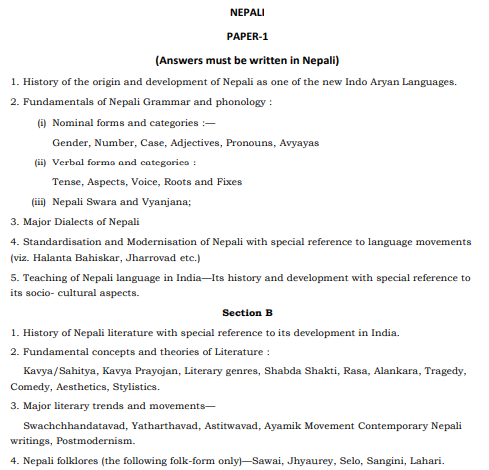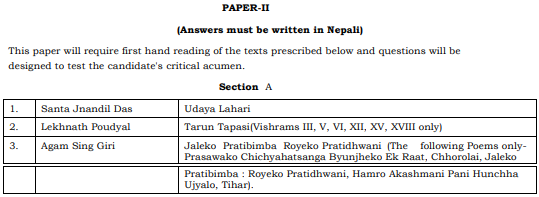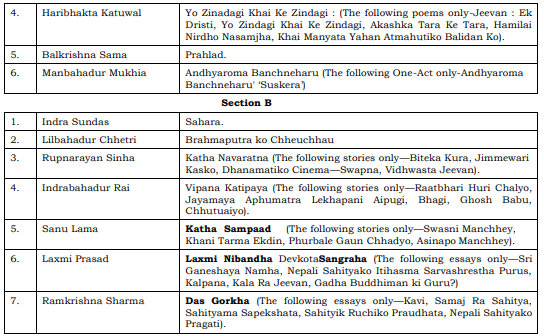UPSC Nepali literature Syllabus: Download PDF
By BYJU'S Exam Prep
Updated on: November 14th, 2023
UPSC Nepali Literature Syllabus must be analyzed properly by those who have chosen the Nepali subject as their optional in UPSC Exam. The Nepali language is used in the parts of Sikkim, Assam, Bihar, West Bengal, Himachal Pradesh, and Uttarakhand, in India. UPSC Nepali Literature Syllabus covers the history of the origin and development of the Nepali language and the history of the Nepali language in a detailed manner. Additionally, the UPSC Nepali optional syllabus mentions texts that would test the candidates’ critical ability.
We have covered the complete UPSC Nepali Literature Syllabus below for those who have opted for the Nepali optional. Candidates must go through the UPSC Nepali optional syllabus and figure out the right approach to fetch good marks in the Nepali optional subject.
Table of content
UPSC Nepali Literature Syllabus for IAS Mains
There are a total of 48 optional subjects in the UPSC Mains, and each subject is divided into two papers- Paper 1 and Paper 2. So those who have chosen the Nepali as their optional subject have to deal with two papers. UPSC Nepali Literature Syllabus is divided into two papers and each carries 250 marks, which means the total marks carried by the optional paper is 500. If a candidate can fetch good marks on the optional paper then his/her chances of selection would be higher.
UPSC Nepali Literature Syllabus PDF
UPSC Nepali optional syllabus can be downloaded in PDF format from the below-given link. It is advised that candidates must keep a printout of the IAS Nepali literature syllabus during the preparation to ensure they don’t miss out on any topic.
>>Download UPSC Nepali Literature Syllabus PDF
Nepali Literature Syllabus for UPSC Paper 1
Paper 1 of the IAS Nepali literature syllabus includes the History of the origin and development of the Nepali language, Fundamentals of Nepali Grammar, Major Dialects of Nepali, History of Nepali literature, Major literary trends, Nepali folklores, etc.

UPSC Nepali Optional Syllabus Paper 2
Paper 2 of the UPSC Nepali Literature Syllabus is designed to test the critical acumen of the candidates. This paper requires first-hand reading of the texts prescribed below.


UPSC Nepali Literature Syllabus- Preparation Strategy
The preparation of the UPSC Nepali Literature Syllabus must be done in a well-structured manner to get maximum results. Below we have mentioned a step-by-step process to follow during covering the Nepali syllabus for UPSC Mains.
- You only have to cover the topics mentioned in the IAS Nepali literature syllabus that is why first you must go through the Nepali syllabus properly. Covering the topics that are not part of the syllabus would only cost you time.
- After that make sure to choose the right Nepali Literature Books for UPSC
- Figure out a study plan that complements your UPSC Prelims Syllabus and UPSC Mains Syllabus preparation.
- Prepare your own hand-written notes that would help you during the final phase of preparation.
- Go through the UPSC Previous Year Questions Papers so that you can find out the types of questions asked in the exam.
Best Books for Nepali Literature Syllabus for UPSC
UPSC Books for Nepali optional would play a vital role in your preparation for Nepali optional subjects. There are not so many options available when it comes to choosing the right Nepali books. But below we have added some recommended Nepali books that you should not miss.
- Himalayan Voices: An Introduction to Modern Nepali Literature
- Nepal (Footprint Handbook) by Robert Ferguson
- Nepali: A National Language and Its Literature by Michael Hutt
- Modern Literary Nepali: An Introductory Reader (SOAS Studies on South Asia)
- Gems of Nepali Literature by LB Thapa
